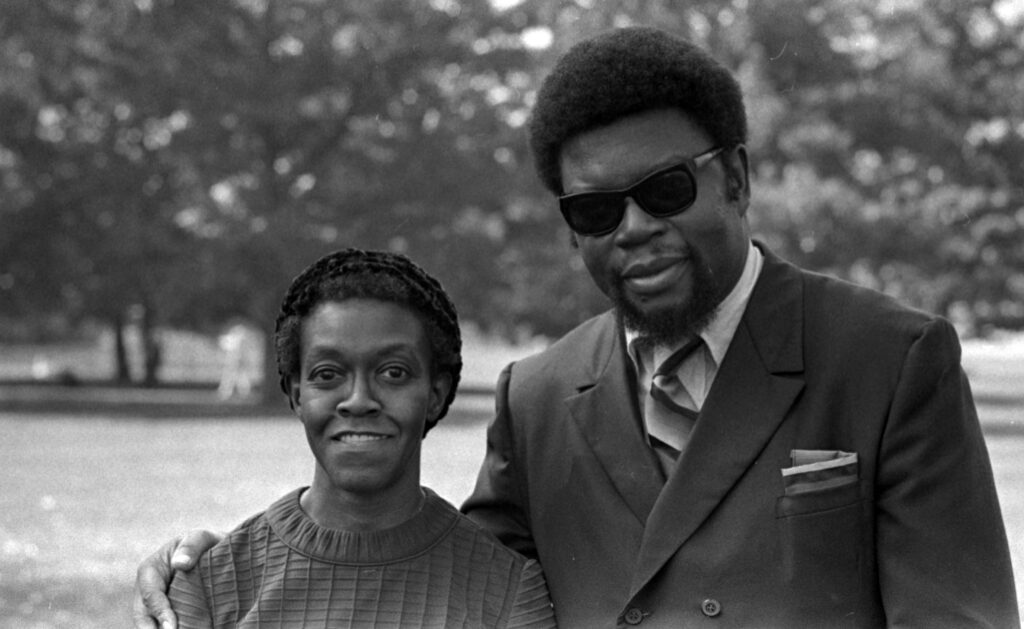Robert L. Williams II, professor emeritus of psychological and brain sciences and of African and African American studies, both in Arts & Sciences, at Washington University in St. Louis, died Aug. 12, 2020. He was 90.
A founding member and early president of the Association of Black Psychologists (ABPsi), Williams co-founded (with Jack Kirkland) Washington University’s Black Studies program, now the Department of African and African-American Studies. An early critic of racial bias in standardized testing and a proponent of African philosophical traditions, he is perhaps best known for coining the term “Ebonics,” a mash-up of “ebony” and “phonics,” to refer to the vernacular English often spoken by African Americans.
Born in Biscoe, Ark., Williams attended Dunbar High School in Little Rock. As a junior, he took an aptitude test that seemed to suggest a career in manual labor, rather than college work. “I lost my confidence for a long time,” he told The Record in 1981, “until other people convinced me that I could make it in college.”
Despite the test, Williams graduated from Dunbar High at age 16. He spent a year at Dunbar Community College before transferring to nearby Philander Smith College, where he earned his bachelor’s degree in 1953. Two years later, Williams earned his master’s of education in psychology from Wayne State University in Detroit and soon was hired as a staff psychologist at Arkansas State Hospital — the first African American to hold such a position in the state.
Williams arrived at Washington University as a graduate student in 1957 and received his doctorate in clinical psychology in 1961. He then served as assistant chief psychologist at the Jefferson Barracks Veterans Affairs Hospital in St. Louis; as director of a hospital improvement project in Spokane, Wash.; and as a consultant for the National Institute of Mental Health, part of the National Institutes of Health (NIH).
Williams helped to organize the ABPsi in 1968, in the months following the assassination of Martin Luther King Jr. Today, it includes more than 1,400 members from across the United States. Williams served as president from 1969-1970.

Williams returned to WashU in 1970 to direct the Black Studies program. The move followed a series of protests by the university’s Association of Black Students. Chief among the group’s demands was the call to establish Black Studies, which students argued would “radically reform our future education.”
“Black Studies was born in the days of high protest,” Williams recalled in a 2019 interview with Gerald Early, the Merle Kling Professor of Modern Letters and current chair of African and African-American Studies. “[It] was really not an easy task … There were many unanswered questions at that time. Even the faculty had questions about the importance or significance of Black Studies.” Nevertheless, he added, “I saw a great deal of opportunity.”
 As chair, Williams quickly established an honors program, an awards program, partnerships with other campus areas and opportunities for international travel, as well as the independent Institute for Black Studies, through which he conducted much of his research. In 1972, he developed the Black Intelligence Test of Cultural Homogeneity, which made national headlines for demonstrating the cultural biases inherent in standardized testing.
As chair, Williams quickly established an honors program, an awards program, partnerships with other campus areas and opportunities for international travel, as well as the independent Institute for Black Studies, through which he conducted much of his research. In 1972, he developed the Black Intelligence Test of Cultural Homogeneity, which made national headlines for demonstrating the cultural biases inherent in standardized testing.
“My prediction was that African Americans would do much better on the Black intelligence test than they would on conventional tests, and white students would do very poorly,” Williams told Early, dryly adding: “That was supported.”
Williams’ conception of Ebonics grew out of a national conference on “The Cognitive and Language Development of Black Children,” which he organized in St. Louis in 1973. Two years later, he edited and published the influential collection “Ebonics: The True Language of Black Folks.” Other major works include “The Collective Black Mind: Toward an Afrocentric Theory of Black Personality” (1980), “Racism Learned at an Early Age through Racial Scripting” (2007), a history of the ABPsi (2008) and dozens of scholarly papers. In 2014, Washington University honored his legacy with daylong conference on diversity in academia. In 2017, he received a Legacy Award at the university’s Trailblazers recognition ceremony.
William’s wife of nearly 70 years, Ava Lee (Kemp) Williams, died in 2018. The couple is survived by seven children: Julius, Yvonne, Larry, Reva, Dorothy, Robert and Michael (all of whom studied at Washington University); as well as 19 grandchildren, 19 great-grandchildren and two great-great-grandchildren.
“Although his education and knowledge of psychological issues related to African Americans laid the foundation for his career,” Yvonne observed, “his greatest strength was Rosie Lee Mitchell, his mother, a Christian woman with a second-grade education who valued education. When he was little, she told him, ‘Boy, go get that piece of paper.’
“And he did.”